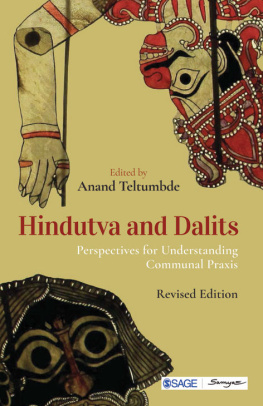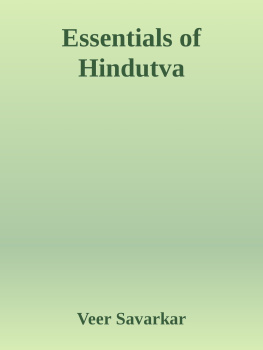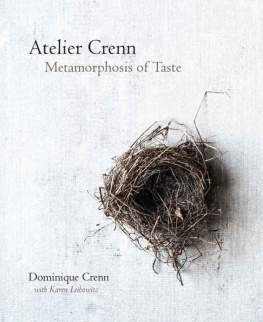Edward Anderson - Neo-Hindutva
Here you can read online Edward Anderson - Neo-Hindutva full text of the book (entire story) in english for free. Download pdf and epub, get meaning, cover and reviews about this ebook. year: 2020, publisher: Taylor and Francis, genre: Politics. Description of the work, (preface) as well as reviews are available. Best literature library LitArk.com created for fans of good reading and offers a wide selection of genres:
Romance novel
Science fiction
Adventure
Detective
Science
History
Home and family
Prose
Art
Politics
Computer
Non-fiction
Religion
Business
Children
Humor
Choose a favorite category and find really read worthwhile books. Enjoy immersion in the world of imagination, feel the emotions of the characters or learn something new for yourself, make an fascinating discovery.
- Book:Neo-Hindutva
- Author:
- Publisher:Taylor and Francis
- Genre:
- Year:2020
- Rating:3 / 5
- Favourites:Add to favourites
- Your mark:
- 60
- 1
- 2
- 3
- 4
- 5
Neo-Hindutva: summary, description and annotation
We offer to read an annotation, description, summary or preface (depends on what the author of the book "Neo-Hindutva" wrote himself). If you haven't found the necessary information about the book — write in the comments, we will try to find it.
Neo-Hindutva — read online for free the complete book (whole text) full work
Below is the text of the book, divided by pages. System saving the place of the last page read, allows you to conveniently read the book "Neo-Hindutva" online for free, without having to search again every time where you left off. Put a bookmark, and you can go to the page where you finished reading at any time.
Font size:
Interval:
Bookmark:

Neo-Hindutva explores the recent proliferation and evolution of Hindu nationalism the assertive, majoritarian, right-wing ideology that is transforming contemporary India.
This volume develops and expands on the idea of neo-Hindutva Hindu nationalist ideology which is evolving and shifting in new, surprising, and significant ways, requiring a reassessment and reframing of prevailing understandings. The contributors identify and explain the ways in which Hindu nationalism increasingly permeates into new spaces: organisational, territorial, conceptual, rhetorical. The scope of the chapters reflects the diversity of contemporary Hindutva both in India and beyond which appears simultaneously brazen but concealed, nebulous, and mainstreamed, militant yet normalised. They cover a wide range of topics and places in which one can locate new forms of Hindu nationalism: courts of law, the Northeast, the diaspora, Adivasi (tribal) communities, a powerful yoga guru, and the Internet. The volume also includes an in-depth interview with Christophe Jaffrelot and a postscript by Deepa Reddy.
Helping readers to make sense of contemporary Hindutva, Neo-Hindutva is ideal for scholars of India, Hinduism, Nationalism, and Asian Studies more generally.
This book was originally published as a special issue of Contemporary South Asia.
Edward Anderson is the Smuts Research Fellow in Commonwealth Studies at the University of Cambridge, UK. He is based in the Department of Politics and International Studies, and at Trinity College, Cambridge. From October 2019 he will be a Senior Research Fellow at Ludwig Maximilians University, Munich, Germany.
Arkotong Longkumer is an Anthropologist who teaches Religious Studies at the University of Edinburgh, UK. He is the author of Reform, Identity and Narratives of Belonging: The Heraka Movement of Northeast India (2010). He is currently finishing a book on Hindu nationalism and indigenous peoples in Northeast India.
Evolving Forms, Spaces, and Expressions of Hindu Nationalism
Edited by
Edward Anderson and Arkotong Longkumer

First published 2020
by Routledge
2 Park Square, Milton Park, Abingdon, Oxon, OX14 4RN
and by Routledge
52 Vanderbilt Avenue, New York, NY 10017
Routledge is an imprint of the Taylor & Francis Group, an informa business
2020 Taylor & Francis
Chapter 7 2018 Sahana Udupa. Originally published as Open Access.
With the exception of , please see the chapters Open Access footnotes.
Trademark notice: Product or corporate names may be trademarks or registered trademarks, and are used only for identification and explanation without intent to infringe.
British Library Cataloguing-in-Publication Data
A catalogue record for this book is available from the British Library
ISBN13: 978-0-367-36975-0
Typeset in Myriad Pro
by codeMantra
Publishers Note
The publisher accepts responsibility for any inconsistencies that may have arisen during the conversion of this book from journal articles to book chapters, namely the inclusion of journal terminology.
Disclaimer
Every effort has been made to contact copyright holders for their permission to reprint material in this book. The publishers would be grateful to hear from any copyright holder who is not here acknowledged and will undertake to rectify any errors or omissions in future editions of this book.
Edward Anderson and Arkotong Longkumer
Saumya Saxena
Arkotong Longkumer
Bhuvi Gupta and Jacob Copeman
Ketan Alder
Priya Swamy
Sahana Udupa
Edward Anderson and Christophe Jaffrelot
Deepa S. Reddy
The following chapters were originally published in Contemporary South Asia, volume 26, issue 4 (2018) and Contemporary South Asia, volume 27, issue 3 (2019). When citing this material, please use the original page numbering for each article, as follows:
Courting Hindu nationalism: law and the rise of modern Hindutva
Saumya Saxena
Contemporary South Asia, volume 26, issue 4 (2018) pp. 378399
Nagas cant sit lotus style: Baba Ramdev, Patanjali, and Neo-Hindutva
Arkotong Longkumer
Contemporary South Asia, volume 26, issue 4 (2018) pp. 400420
Awakening Hindu nationalism through yoga: Swami Ramdev and the Bharat Swabhiman movement
Bhuvi Gupta and Jacob Copeman
Contemporary South Asia, volume 27, issue 3 (2019) pp. 313329
Authority, ethics and service (seva) amongst Hindu nationalists in Indias assertive margins
Ketan Alder
Contemporary South Asia, volume 26, issue 4 (2018) pp. 421438
Neo-Hindutva affective economies: feelings of pride and offense among Surinamese Hindus in the Netherlands
Priya Swamy
Contemporary South Asia, volume 26, issue 4 (2018) pp. 439452
Enterprise Hindutva and social media in urban India
Sahana Udupa
Contemporary South Asia, volume 26, issue 4 (2018) pp. 453467
Hindu nationalism and the saffronisation of the public sphere: an interview with Christophe Jaffrelot
Edward Anderson and Christophe Jaffrelot
Contemporary South Asia, volume 26, issue 4 (2018) pp. 468482
What is neo- about neo-Hindutva?
Deepa S. Reddy
Contemporary South Asia, volume 26, issue 4 (2018) pp. 483490
For any permission-related enquiries please visit:
http://www.tandfonline.com/page/help/permissions
Ketan Alder lectures in Religions and Theology at the University of Manchester, UK, and is Graduate and Early Career Representative for the British Association for South Asian Studies. Ketan has written widely on Hindu nationalism, covering issues such as service, children, and Sanskrit in Hindu nationalist schools, and Hindu representation and the politics of caste in north India. His work pays special attention to the ritual-politics of subaltern actors, with a focus on critically considering the voices of activists which go beyond secular/sacred binaries.
Edward Anderson is the Smuts Research Fellow in Commonwealth Studies at the University of Cambridge, UK. He is based in the Department of Politics and International Studies, and at Trinity College, Cambridge. From October 2019 he will be a Senior Research Fellow at Ludwig Maximilians University, Munich, Germany.
Jacob Copeman is a Senior Lecturer in Social Anthropology at the University of Edinburgh, UK. He is a co-author, with Dwaipayan Banerjee, of Hematologies: The Political Life of Blood in India (2019).
Bhuvi Gupta is a Consultant working in Indias development sector and an Independent Researcher with degrees in Literature, Cultural Studies and Sociology.
Christophe Jaffrelot is a Senior Research Fellow at CERI-Sciences Po/CNRS, and a Professor of Indian Politics and Sociology at the Kings India Institute (London).
Font size:
Interval:
Bookmark:
Similar books «Neo-Hindutva»
Look at similar books to Neo-Hindutva. We have selected literature similar in name and meaning in the hope of providing readers with more options to find new, interesting, not yet read works.
Discussion, reviews of the book Neo-Hindutva and just readers' own opinions. Leave your comments, write what you think about the work, its meaning or the main characters. Specify what exactly you liked and what you didn't like, and why you think so.











